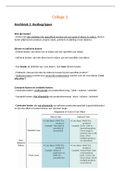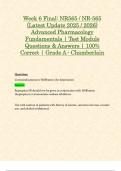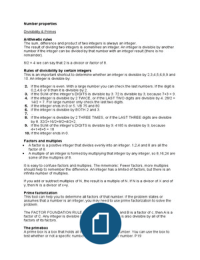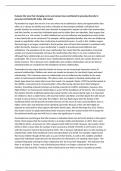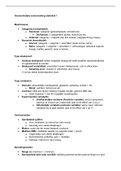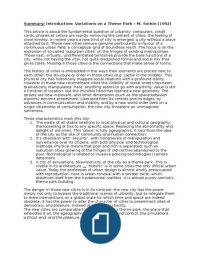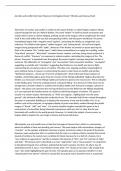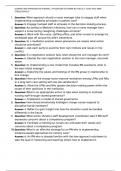Practice essay questions for A Level Politics (Edexcel)
Paragraph 1 - Devolution
Devolution of legislative power to Scotland, Wales and Northern Ireland greatly limits
Parliament but still retains overall power.
Does not lie within parliament
- Referendums - Parliament devolved substantial power to the newly created Scottish
Parliament, Welsh Assembly and N.I. Assembly.
- E.g. Government of Wales Act (2006), Scotland Act (2012), Wales Act (2014)
and Scotland Act (2016), all devolved greater legislative and financial powers
- Further reducing the number of reserved matters on which only Parliament can legislate
- Made it clear that Parliament retained the right to make laws on any matter, even those
that had been devolved
- Sewel Convention recognised by the Scotland Act (2016) + despite the fact that
Parliament could legally pass laws in devolved matters without first seeking
approval, it has always waited for a ‘legislative consent motion’ to first be passed
- Devolution acts as a considerable constraint upon the laws that Parliament can now
pass
- While the devolution Acts could be repealed, and power restored to Parliament, this is
arguably politically unthinkable without first holding a referendum
Lies within parliament
- Legally the UK still has unitary constitution and power can always be restored to
parliament
- Devolution has indeed acted as a constraint on Parliament’s political sovereignty but
Parliament retains sovereignty
- For example Scotland Act (1998) makes it clear that the Scottish Parliament’s
power to make laws “does not affect the power of the Parliament of the United
Kingdom to make laws for Scotland”
- Sewel Convention not legally enforceable
- 2017 devolved administrations argued in SC that the Sewel Convention
required legislative consent motions to be passed before Parliament could
give the Westminster power to begin the process of withdrawing from the
EU
- SC ruled that as important as the Sewel Convention is, it had no power to
enforce constitutional conventions
- While the UK may function as a ‘quasi-federal’ state, it is legally very different to federal
states, where the constitution recognises that sovereignty is shared between federal and
regional governments
Paragraph 2 - Rights
,The judiciary can declare laws to be incompatible with the HRA/ECHR but not legally
binding.
Does not lie within parliament
- HRA requires judges to issue a ‘declaration of incompatibility’
- While this declaration does not strike down the law, it does place Parliament under
considerable political pressure to make necessary amendments
- Parliament has usually responded quickly to ensure laws are compatible
- Ministers are significantly limited in the bills they can propose
- Legislators go to great efforts to ensure that bills comply with the HRA + Parliament
responds swiftly when the SC finds Acts of Parliament to be incompatible
- UNISON 2017 case
- Fees Order deemed ultra vires / unlawful because they impede access to
justice, and defy the rule of law
- The government immediately ceased collecting them and pledged to
reimburse the fees it had already collected
- R v Chaytor 2010
- Case limiting parliamentary privilege
- Trials of 3 former MPs over the expenses scandal
- MPs went to the SC to claim protection by parliamentary privilege
- SC judged that they were not protected from prosecution
- HRA is recognised as a ‘constitutional statute’, which cannot be implicitly repealed
Lies within parliament
- The UK Supreme Court cannot strike down laws, and the HRA can always be
Repealed
- Declarations of incompatibility can place Parliament under considerable pressure, it
is still up to Parliament to decide how to respond
- Beginning with the case Hirst v the United Kingdom (2005), the ECHR has
repeatedly ruled that the UK’s blanket ban on prisoners voting is a breach of
their human rights
- Yet Parliament has refused to amend the law
- 2011 Commons passed motion against prisoners gaining the vote by 234 to 22
- Politically awkward for the UK government to show so little progress in responding to
the decision, despite voluntarily agreeing to comply with the ECHR’s rulings, it
nonetheless demonstrates that Parliament remains legally sovereign
Paragraph 3 - Fusion of powers means that, in practice, it is often the executive that is
sovereign
Does not lie within parliament
- Executive has considerable control over the legislative branch and make Parliament an
elective dictatorship
- Blair had a 179 seat majority so was initially able to dominate Parliament
, - He was able to push his reforms through with little opposition
- 2003 he absorbed a big backbench rebellion over Iraq + survived Robin
Cook’s high profile resignation
- Shows government can dominate and therefore undermine Parliament’s role
in legislation
- PM along with the other government ministers can all vote in favour of government
Bills
- Collective responsibility requires government ministers to support government bills so
gov can rely upon as many as 118 votes even before an effort is made to convince
other MPs to lend their support
- Reward loyalty from other MPs, by directly promoting them into the ranks of
Government
- Helps the whips to keep backbench MPs supportive, and means that a government
with a sizable majority in the Commons can be confident that its bills will not be
Defeated
- PM with a large majority in the Commons can enjoy considerable power (House of
Lords cannot veto bills, monarch is bound by convention to always sign bills, and SC is
unable to strike down Acts of Parliament)
Lies within parliament
- Power wielded by the executive has clear political and legal limits
- Legally, Parliament is sovereign, not the executive
- PM with a large majority in the House of Commons may have remarkable political
power, but they are not a monarch, with absolute legal power, who can simply declare
new laws into existence
- Following the 2016 EU referendum, the Conservative Government was confident
that it could rely upon royal prerogative powers to trigger Article 50 of the Treaty
of European Union, and begin exit negotiations
- R Miller v Secretary of State for the Exiting the EU 2017 - ruled that British gov
may not initiate withdrawal from the EU without an Act of Parliament giving the
gov Parliament’s permission to do so
- Political power can be fickle, and the executive can never know when our sovereign
Parliament may put a break on their plans
Evaluate the view that the PM has too much power (teacher said he is almost certain on this
so im gonna plan a proper good one for this and make sure you learn it inside and out and
guarantee a banger)
Para 1 - house of commons
- Too much power - PM can easily dominate over the house of commons
- Role of FPTP in the house of commons ensures huge majorities and therefore
large loyalty within the commons
, - Boris had a 42% vote share yet an 80 seat majority in the common in
2019. Average government majorities have been 57.5 since 1945.
- This explains why between 2007 - 2015, 94% of government bills passed
and Thatcher only ost 4 times in 11 years
- BBC broadcast display the inactivity of backbench MPs, with seats often
empty
- Not too much power - house of commons effectively scrutinises PM
- In 2022, 101 Conservative MPs voted against Boris over plan b COVID plans.
(led to heavy reliance on Labour support)
- Limits on FPTP as May (with a hung parliament) lost 33 times in the space of 2
years
- Role of PMQs in the house of commons, Blairs “weak,weak,weak”
- Moving towards a presidential democracy, where the PM can control those below
him. The commons have become weaker due to royal prerogative powers such
as May in 2018 avoiding parliament to launch air strikes
Para 2 - House of lords
- Too much power - PM dominates over House of Lords
- Inability to scrutinise
- 1911 +1949 parliamentary acts
- In 2017 inflicted two defeats on brexit bill yet it still eventually
passed
- Dubs amendment simply ignored by May’s administration
- Lords easily persuaded by executive
- The PM can place his own people in the lords. Such as Boris Johnson
and Lebedev despite concerns from MI6
- Not too much power - House of lords effectively scrutinises PM
- PM has very little influence on Lords as many are idnepednant, and 186 are
cross bench
- Effectiveness of scrutiny by the House of Lords has vastly improved
- From 2015 - 2016, there had been over 1250 amendments
- Ability to delay bills repeatedly as seen with the terrorism bill in 2008
- Down to 92 peers from lords reform
Para 3 - Judiciary
- Too much power
- Can easily undermine SC rulings due to where sovereignty lies in the UK. huge
control over parliament
- Ahmed v treasury 2009 - SC ruled that the reasury cannot seize assets -
Yet brown passed the 2010 Terrorist freezing asset act
- UK v Hirst in 2005 was rejected by the executive to prevent criminals
receiving the vote
- Not too much power
- Gina Miller cases
- 2017 - executive cannot trigger article 50 without consent from parliament
- 2019 - executive cannot prorogue parliament
Paragraph 1 - Devolution
Devolution of legislative power to Scotland, Wales and Northern Ireland greatly limits
Parliament but still retains overall power.
Does not lie within parliament
- Referendums - Parliament devolved substantial power to the newly created Scottish
Parliament, Welsh Assembly and N.I. Assembly.
- E.g. Government of Wales Act (2006), Scotland Act (2012), Wales Act (2014)
and Scotland Act (2016), all devolved greater legislative and financial powers
- Further reducing the number of reserved matters on which only Parliament can legislate
- Made it clear that Parliament retained the right to make laws on any matter, even those
that had been devolved
- Sewel Convention recognised by the Scotland Act (2016) + despite the fact that
Parliament could legally pass laws in devolved matters without first seeking
approval, it has always waited for a ‘legislative consent motion’ to first be passed
- Devolution acts as a considerable constraint upon the laws that Parliament can now
pass
- While the devolution Acts could be repealed, and power restored to Parliament, this is
arguably politically unthinkable without first holding a referendum
Lies within parliament
- Legally the UK still has unitary constitution and power can always be restored to
parliament
- Devolution has indeed acted as a constraint on Parliament’s political sovereignty but
Parliament retains sovereignty
- For example Scotland Act (1998) makes it clear that the Scottish Parliament’s
power to make laws “does not affect the power of the Parliament of the United
Kingdom to make laws for Scotland”
- Sewel Convention not legally enforceable
- 2017 devolved administrations argued in SC that the Sewel Convention
required legislative consent motions to be passed before Parliament could
give the Westminster power to begin the process of withdrawing from the
EU
- SC ruled that as important as the Sewel Convention is, it had no power to
enforce constitutional conventions
- While the UK may function as a ‘quasi-federal’ state, it is legally very different to federal
states, where the constitution recognises that sovereignty is shared between federal and
regional governments
Paragraph 2 - Rights
,The judiciary can declare laws to be incompatible with the HRA/ECHR but not legally
binding.
Does not lie within parliament
- HRA requires judges to issue a ‘declaration of incompatibility’
- While this declaration does not strike down the law, it does place Parliament under
considerable political pressure to make necessary amendments
- Parliament has usually responded quickly to ensure laws are compatible
- Ministers are significantly limited in the bills they can propose
- Legislators go to great efforts to ensure that bills comply with the HRA + Parliament
responds swiftly when the SC finds Acts of Parliament to be incompatible
- UNISON 2017 case
- Fees Order deemed ultra vires / unlawful because they impede access to
justice, and defy the rule of law
- The government immediately ceased collecting them and pledged to
reimburse the fees it had already collected
- R v Chaytor 2010
- Case limiting parliamentary privilege
- Trials of 3 former MPs over the expenses scandal
- MPs went to the SC to claim protection by parliamentary privilege
- SC judged that they were not protected from prosecution
- HRA is recognised as a ‘constitutional statute’, which cannot be implicitly repealed
Lies within parliament
- The UK Supreme Court cannot strike down laws, and the HRA can always be
Repealed
- Declarations of incompatibility can place Parliament under considerable pressure, it
is still up to Parliament to decide how to respond
- Beginning with the case Hirst v the United Kingdom (2005), the ECHR has
repeatedly ruled that the UK’s blanket ban on prisoners voting is a breach of
their human rights
- Yet Parliament has refused to amend the law
- 2011 Commons passed motion against prisoners gaining the vote by 234 to 22
- Politically awkward for the UK government to show so little progress in responding to
the decision, despite voluntarily agreeing to comply with the ECHR’s rulings, it
nonetheless demonstrates that Parliament remains legally sovereign
Paragraph 3 - Fusion of powers means that, in practice, it is often the executive that is
sovereign
Does not lie within parliament
- Executive has considerable control over the legislative branch and make Parliament an
elective dictatorship
- Blair had a 179 seat majority so was initially able to dominate Parliament
, - He was able to push his reforms through with little opposition
- 2003 he absorbed a big backbench rebellion over Iraq + survived Robin
Cook’s high profile resignation
- Shows government can dominate and therefore undermine Parliament’s role
in legislation
- PM along with the other government ministers can all vote in favour of government
Bills
- Collective responsibility requires government ministers to support government bills so
gov can rely upon as many as 118 votes even before an effort is made to convince
other MPs to lend their support
- Reward loyalty from other MPs, by directly promoting them into the ranks of
Government
- Helps the whips to keep backbench MPs supportive, and means that a government
with a sizable majority in the Commons can be confident that its bills will not be
Defeated
- PM with a large majority in the Commons can enjoy considerable power (House of
Lords cannot veto bills, monarch is bound by convention to always sign bills, and SC is
unable to strike down Acts of Parliament)
Lies within parliament
- Power wielded by the executive has clear political and legal limits
- Legally, Parliament is sovereign, not the executive
- PM with a large majority in the House of Commons may have remarkable political
power, but they are not a monarch, with absolute legal power, who can simply declare
new laws into existence
- Following the 2016 EU referendum, the Conservative Government was confident
that it could rely upon royal prerogative powers to trigger Article 50 of the Treaty
of European Union, and begin exit negotiations
- R Miller v Secretary of State for the Exiting the EU 2017 - ruled that British gov
may not initiate withdrawal from the EU without an Act of Parliament giving the
gov Parliament’s permission to do so
- Political power can be fickle, and the executive can never know when our sovereign
Parliament may put a break on their plans
Evaluate the view that the PM has too much power (teacher said he is almost certain on this
so im gonna plan a proper good one for this and make sure you learn it inside and out and
guarantee a banger)
Para 1 - house of commons
- Too much power - PM can easily dominate over the house of commons
- Role of FPTP in the house of commons ensures huge majorities and therefore
large loyalty within the commons
, - Boris had a 42% vote share yet an 80 seat majority in the common in
2019. Average government majorities have been 57.5 since 1945.
- This explains why between 2007 - 2015, 94% of government bills passed
and Thatcher only ost 4 times in 11 years
- BBC broadcast display the inactivity of backbench MPs, with seats often
empty
- Not too much power - house of commons effectively scrutinises PM
- In 2022, 101 Conservative MPs voted against Boris over plan b COVID plans.
(led to heavy reliance on Labour support)
- Limits on FPTP as May (with a hung parliament) lost 33 times in the space of 2
years
- Role of PMQs in the house of commons, Blairs “weak,weak,weak”
- Moving towards a presidential democracy, where the PM can control those below
him. The commons have become weaker due to royal prerogative powers such
as May in 2018 avoiding parliament to launch air strikes
Para 2 - House of lords
- Too much power - PM dominates over House of Lords
- Inability to scrutinise
- 1911 +1949 parliamentary acts
- In 2017 inflicted two defeats on brexit bill yet it still eventually
passed
- Dubs amendment simply ignored by May’s administration
- Lords easily persuaded by executive
- The PM can place his own people in the lords. Such as Boris Johnson
and Lebedev despite concerns from MI6
- Not too much power - House of lords effectively scrutinises PM
- PM has very little influence on Lords as many are idnepednant, and 186 are
cross bench
- Effectiveness of scrutiny by the House of Lords has vastly improved
- From 2015 - 2016, there had been over 1250 amendments
- Ability to delay bills repeatedly as seen with the terrorism bill in 2008
- Down to 92 peers from lords reform
Para 3 - Judiciary
- Too much power
- Can easily undermine SC rulings due to where sovereignty lies in the UK. huge
control over parliament
- Ahmed v treasury 2009 - SC ruled that the reasury cannot seize assets -
Yet brown passed the 2010 Terrorist freezing asset act
- UK v Hirst in 2005 was rejected by the executive to prevent criminals
receiving the vote
- Not too much power
- Gina Miller cases
- 2017 - executive cannot trigger article 50 without consent from parliament
- 2019 - executive cannot prorogue parliament


